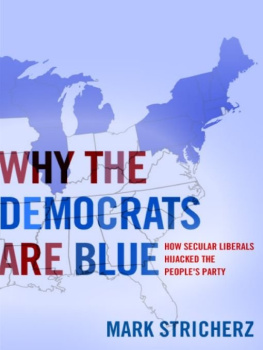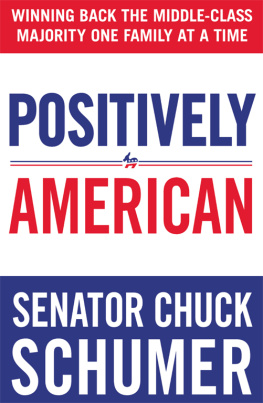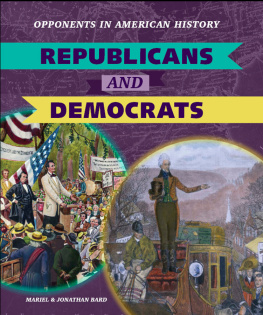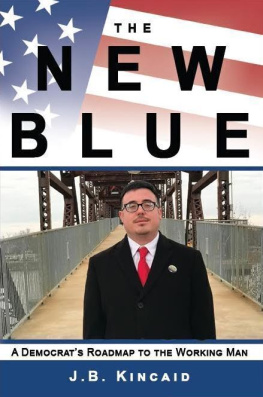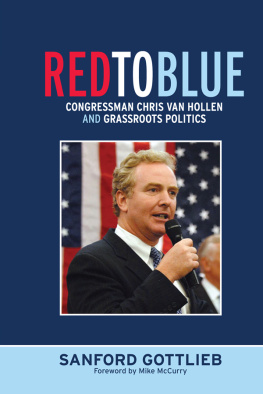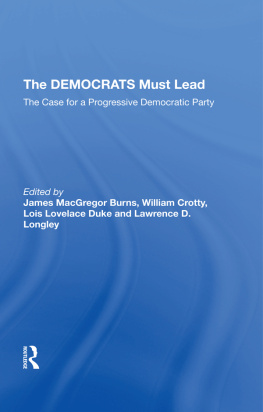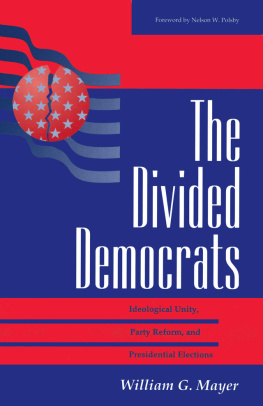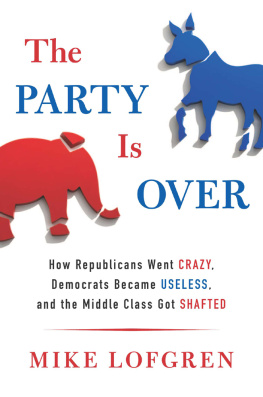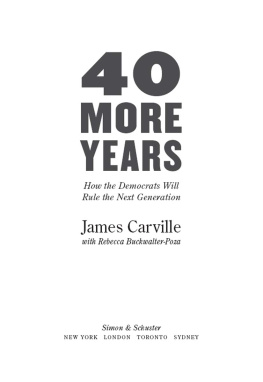Introduction
The Democrats limped out of Chicago divided and discouraged, the latest casualties in a culture war that went beyond differences over Vietnam. It would reshape and realign American politics for the rest of the century and beyond, and frustrate most efforts to focus the electorate on the issues that most affect their lives and livelihoods, as opposed to their psyches. The kids and their supporters saw the mayor and the cops as authoritarian, ignorant, violent bigots. The mayor and his largely blue-collar ethnic police force saw the kids as foul-mouthed, immoral, unpatriotic, soft, upper class kids who were too spoiled to respect authority, too selfish to appreciate what it takes to hold a society together, too cowardly to serve in Vietnam.... Much of my public life was spent trying to bridge the cultural and psychological divide that had widened into a chasm in Chicago.
BILL CLINTON, MY LIFE: THE EARLY YEARS
With the race for the 2008 presidential election under way, its tempting to conclude that the Democratic Partys candidates can ignore former president Bill Clintons warning about the culture war. There is a rough consensus that the Democrats are favored to take back the White House; that Democrats will ride in on voter disenchantment with President George W. Bushs handling of the Iraq War, as they did in the 2006 midterms; and that the partys candidates will reach out to culturally conservative religious and blue-collar voters, as Senators Hillary Clinton and Barack Obama already have done.
The conventional wisdom is reasonable enough. If Iraq continues to haunt the Republicans, the economy nosedives, or the Democratic presidential nominee makes a major concession to social conservatives, the Democrats probably will win the White House. There will be joy in Berkeley and Oakland, Evanston and Chicago, Cambridge and Boston.
But the conventional wisdom is shortsighted. Should the news from Iraq improve, the economy stay strong, and the Republicans nominate a cultural conservative, more voters will be likely to make their choices around issues like abortion and homosexuality. In the past five presidential elections, the percentage of Americans who vote on social issues has swung between one-seventh and one-third of all voters. Given that the vast majority of values voters choose the more culturally conservative candidate, the Democrats might well lose the presidency. Again.
The social issue has played a major role in keeping a Democrat out of the White House in six of the last nine elections. When Ben Wattenberg and Richard Scammon coined the term in their 1970 classic,
The Real Majority, the social issue comprised race, crime, and values. Although President Clinton helped diminish the importance of the first two, Democrats continue to stumble over values issues, as David Carlin, former Democratic majority leader in the Rhode Island Senate, has argued:
As the Civil War approached, the Democrats took the wrong position on slavery, and they found themselves, except for a few episodes of prosperity, Americas minority party from the election of Abraham Lincoln in 1860 until the election of Franklin Roosevelt in 1932. At the time of the Great Depression of the 1930s, the Republicans took the wrong position on the social and economic welfare responsibilities of the federal government, and they remained Americas number-two party until the coming of Ronald Reagan and Newt Gingrich in the 1980s and 90s. Today the Democrats are taking the wrong position on morality and religion, which may doom them to remain Americas minority until well into the twenty-first century.
The wrong position that national Democratic leaders have taken is that of secular liberalism. They oppose extending any legal protections to an unprotected class of human beingsunborn infants. And they favor granting public benefits to homosexual couples. Considering that the national party was known as the party of the little guy and was led by Catholic big-city and state bosses, the post-1968 partys support for secular liberalism qualifies as a revolution, not an evolution.
So why did the national Democratic Party side with secular liberals (the kids and their supporters, as Bill Clinton said in his autobiography) rather than religious traditionalists (the mayor and his largely blue-collar ethnic police force)? The question is of more than historical interest. To political observers, it should affect how they evaluate the Democratic presidential candidates. To those disgruntled with the national Democratic leadership, it should affect how they seek to reform the party.
I got a chance recently to pose this question to Bill Clinton, when he attended a funeral service at the National Cathedral in Washington for Eugene McCarthy. Clinton had delivered a eulogy for the former Minnesota senator, who in his 1968 campaign ran against the immoral Vietnam War and the autocratic Democratic bosses like Mayor Daley. After the service, Clinton stopped to chat with people in the crowd, smiling and laughing and having pictures taken. Spotting a lull in his repartee, I asked the former president if he thought the McCarthy movement was the transition between the old party, which was formed into the New Deal or Roosevelt coalition, and the current party. He paused for seven or eight seconds, looked away briefly, and pursed his lips.
Yes and no, Clinton said plainly. I think that he reflected the beliefs that Democrats had in the sixties. He didnt want to give up the old members of the party, the blue-collar workers. He was someone who, as you heard today, had grown up in a small town. He didnt think that because blue-collar workers favored the war, they would leave the party. And I think he would have been appalled at the massive cultural change that took place between the two parties. A lot of the things that happened in 68 caused that.
When I tried to ask a follow-up question, he tapped me on the wrist with his large left hand. Im fixin to say something, he said. I lived through that time, and I loved Bobby Kennedy, but if you look at what he was doing to get the support of blue-collar workers, he was making very emotional appeals and speeches. See, what McCarthy was trying to do was to get them off the farms. I think they understood that he was from Minnesota and had worked a combine. So they could oppose the war just like the kids were. He tried to talk to them in more of a calm tone [than did Kennedy]. Clinton then got around to addressing the culture wars: I think he would have been repulsedI think it would have made him sadthat urban, rural, and suburban voters were voting on guns, gays, and whatever. It all started in the late sixties.
Clinton is right to focus on the McCarthy movement and the culture war. When political observers discuss the revolution in the national Democratic Party, they focus on the defection of the South in response to the passage of civil rights legislation in the 1960s. Their explanation isnt crazy, but its only half the picture. Like them, Clinton failed to identify the real reason that the party sided with secular liberals instead of religious traditionalists. That is ironic, because in the summer of 1969 Clinton visited a friend in Washington who was interning for the McGovern Commission and made the acquaintance of a commission member.
Officially known as the Commission on Party Structure and Delegate Selection, the commission was approved by a majority of delegates at the very convention that Clinton deplored, the 1968 Democratic National Convention in Chicago. The twenty-eight-member panel is best known for creating the modern presidential nominating system, in which primary and caucus voters rather than big-city and state bosses choose the partys nominee. It is also known for its first chairman, Senator George McGovern, who won the partys nomination in 1972.

